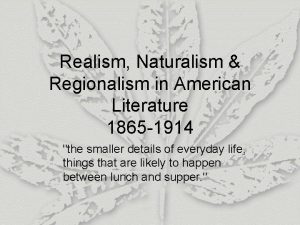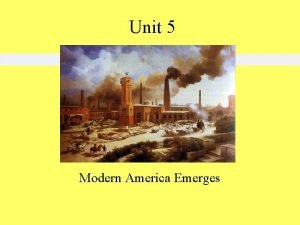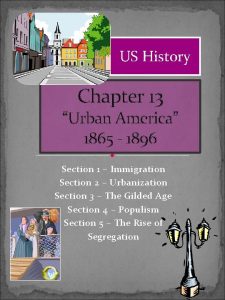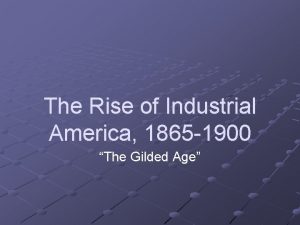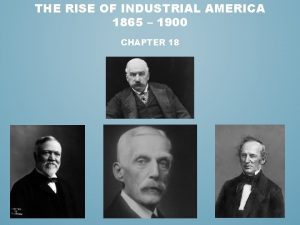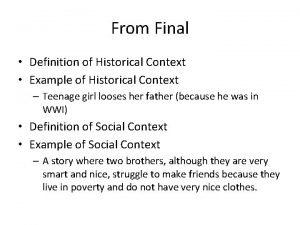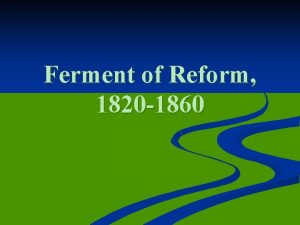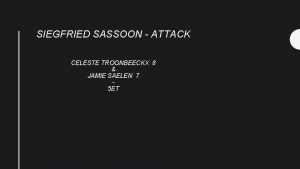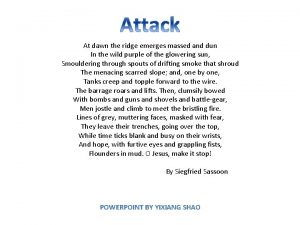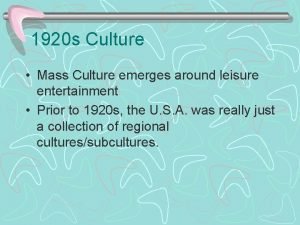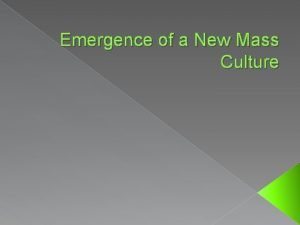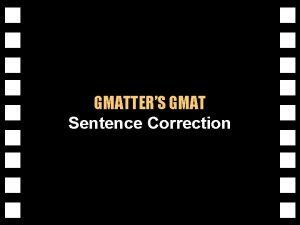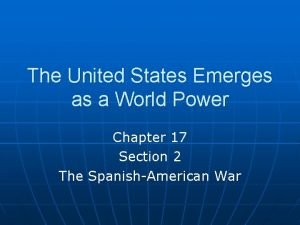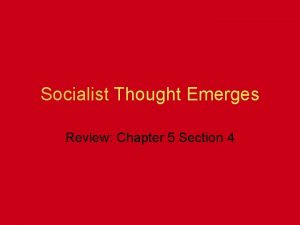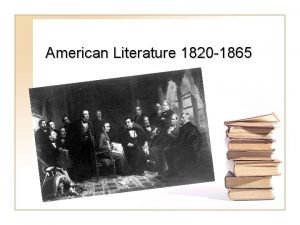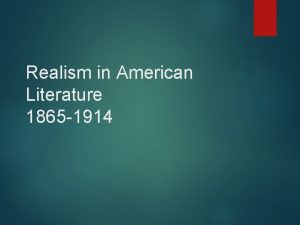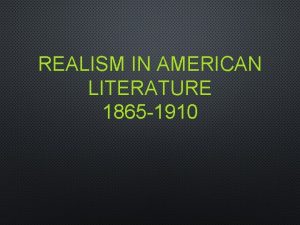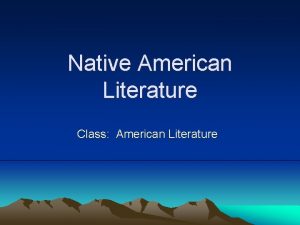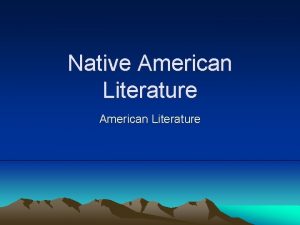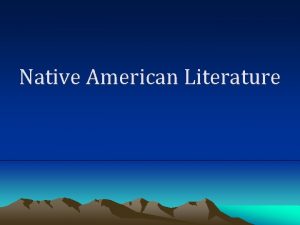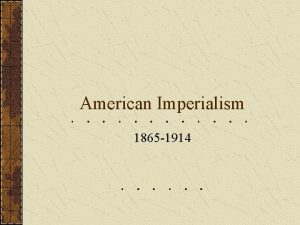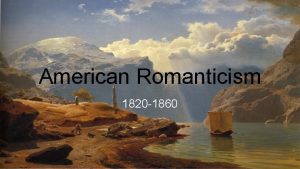American Literature 1820 1865 Historical Context America emerges













- Slides: 13

American Literature 1820 -1865

Historical Context • America emerges on the world scene – Treaty at Yorktown 1781 – Constitution ratified 1787 – Washington elected president 1789 • Fragile national identity – – – Continued Indian skirmishes Shay’s Rebellion 1787 Whiskey Rebellion 1794 Alien and Sedition Act 1798 France and reciprocity • Lack of National Literary Identity – "In the four quarters of the globe, who reads an American book? Or goes to an American play? Or looks at an American picture or statue? " – Sidney Smith, Edinburgh Review

An Intimate Literary Community • A smaller country – “Northwestern” = Ohio, Michigan, Wisconsin; “Southwestern” = Louisiana – Improvements in transportation 18201840 – Most authors read today lived entirely within the original colonies – Few publishing centers, mostly located on the Atlantic seaboard – Literary activity focused within “major” cities (New York, Philadelphia, Boston)

• A smaller literary world – Abundant family connections between major writers – Proliferation of literary societies • Bread and Cheese Club (Manhattan, 1824) – F: Cooper; Att: Bryant, F. B. Morse, Fitz-Greene Halleck, Thomas Cole • Transcendental Club (Boston, 1836 -1840) – F: Emerson; Att: Bronson Alcott, Margaret Fuller, George Ripley • Saturday Club (Boston, 1856) – Att: Emerson, James Russell Lowell, Longfellow, Oliver Wendell Holmes, John Motley, William Prescott (Hawthorne) • Authors Club (New York, 1882)

Economics of American Publishing • National Copyright Law established 1790; legal protection not effective until 1891 – Little protection for writers leads to • bootlegging • loss of British market in 1849 • de facto copyrights ruled illegal • Self-publishing – Whitman, Thoreau • The Author’s dilemma: Sell out or sell nothing?

Literature or Propaganda? • Rhetorical strategy: link literary destiny to geo -political destiny – “The great nation of futurity must have a literature to match Niagara Falls and the Rocky Mountains. ” • Critics (generally) called for settings in the distant national past • Authors (generally) saw American grandeur in the present “Yet America is a poem in our eyes…and it will wait long for metres. ” -- Emerson not

Key Publishing Dates • • • • The Sketch Book – Irving, 1819 The Spy – Cooper, 1821 Tamerlane and Other Poems – Poe, 1827 Nature – Emerson, 1836 Twice-Told Tales – Hawthorne, 1837 Essays: First Series – Emerson, 1841 Narrative of the Life of Frederick Douglass – 1845 Civil Disobedience – Thoreau, 1849 The Scarlet Letter – Hawthorne, 1850 Moby Dick – Melville 1851 Uncle Tom’s Cabin – Stowe, 1852 Walden – Thoreau, 1854 Leaves of Grass – Whitman, 1855 Hiawatha – Longfellow, 1855 The Celebrated Jumping Frog – Twain, 1865 Drum Taps – Whitman, 1865

Preachers without Pulpits • Conformity, Materialism, & the Economy – Most writers saw American “self-reliance” as a sham – “Things are in the saddle and ride mankind” Emerson – Thoreau: creating “artificial wants” (Franklinesque) • Sex and Sexual Roles – Whitman • Healthy body-soul relation • Equality between the sexes • Suffering over repressed homoeroticism (privately recorded) – Dickinson • Critic of female sacrifices within marriage • Unclear sexual orientation

• Nature – 19 th Century was a time of environmental waste – Thoreau, Emerson, and others advocated for communion with nature • …not necessarily preservation of all natural areas • Criticized “rest-day strollers” – No general consensus on character of nature • Orthodox Religion – Rejection of organized Christianity; emphasis on personal experience – Common orthodox bias against most authors The churches are one vast lie; the people do not believe them and they do not believe themselves. – Whitman

• Immigration / Xenophobia – Anti-Catholic sentiment • • Riots in Boston (1834) and Philadelphia (1844) Frequent pamphleteering – Increased immigration from Southeastern Europe – Literary community reactions 1. “…if they can get here, they have God’s right to come” (Melville) 2. Romantic longing for the homogeneous past • Politics – Moral Paradox: American Idealism vs…. • • Genocide of American Indians Black slavery The “Executive’s War” against Mexico John Brown & Harper’s Ferry (1859)

• The Civil War – Turning point in literary history • Irving, Cooper, and Poe deceased before; Thoreau and Hawthorne after • Resurgence of folktale and humor; emergence of realism and regionalism – Detachment of Northern writers • Exception: Whitman and the wounded – Literature inspired by Civil War • First Time Under Fire – De. Forest, 1864 • Drum Taps – Whitman, 1865 • Battle Pieces – Melville, 1866 • The Literary Spirit of the Age …it is better to fail in originality, than to succeed in imitation. -- Melville Re-examine all you have been told at school or church or in any book, dismiss whatever insults your own soul, and your very flesh shall be a great poem… -- Whitman

Transcendentalism • Roots and Influences – German Idealism, European Romanticism, Vedic Literature, Pantheism • Characteristics – – Piety in relationship with nature Rebellion againstitutions, esp. religion Personal religious experience Connection with “Over-Soul” / inherent human divinity – Originality of thought / intellectual self-reliance – Intuition will reveal truth

Romanticism • Characteristics – Knowledge gained through intuition • Experience of strong emotion, esp. sorrow and horror • Folk custom and tradition • Reflection on/connection with nature – – Reverence for past civilizations, esp. medieval Imagination as critical authority Emotion creates aesthetic experience Humanity is innocent, corrupted by society (Rousseau’s noble savage) – Gothic undercurrent – Nationalism
 Regionalism literature
Regionalism literature Modern america emerges
Modern america emerges Urban america 1865 to 1896
Urban america 1865 to 1896 The rise of industrial america 1865-1900
The rise of industrial america 1865-1900 Four features of industrial manufacturing (1865-1900)
Four features of industrial manufacturing (1865-1900) Context history definition
Context history definition American reform movements between 1820 and 1860
American reform movements between 1820 and 1860 At dawn the ridge emerges massed and dun
At dawn the ridge emerges massed and dun At dawn the ridge emerges massed and dun
At dawn the ridge emerges massed and dun Modern mass culture emerges leisure
Modern mass culture emerges leisure Modern mass culture emerges leisure
Modern mass culture emerges leisure As a baby emerges from the darkness of the womb
As a baby emerges from the darkness of the womb The united states emerges as a world power
The united states emerges as a world power Socialist thought emerges
Socialist thought emerges
